Who Wants To Be Luke Skywalker?
by Hope Whitmore
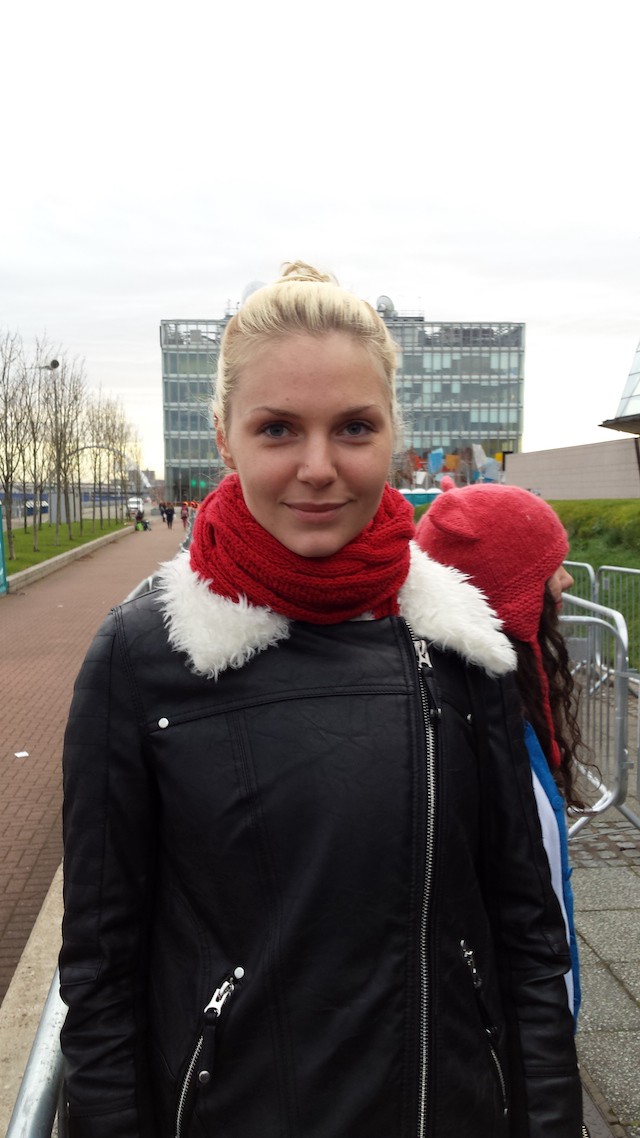
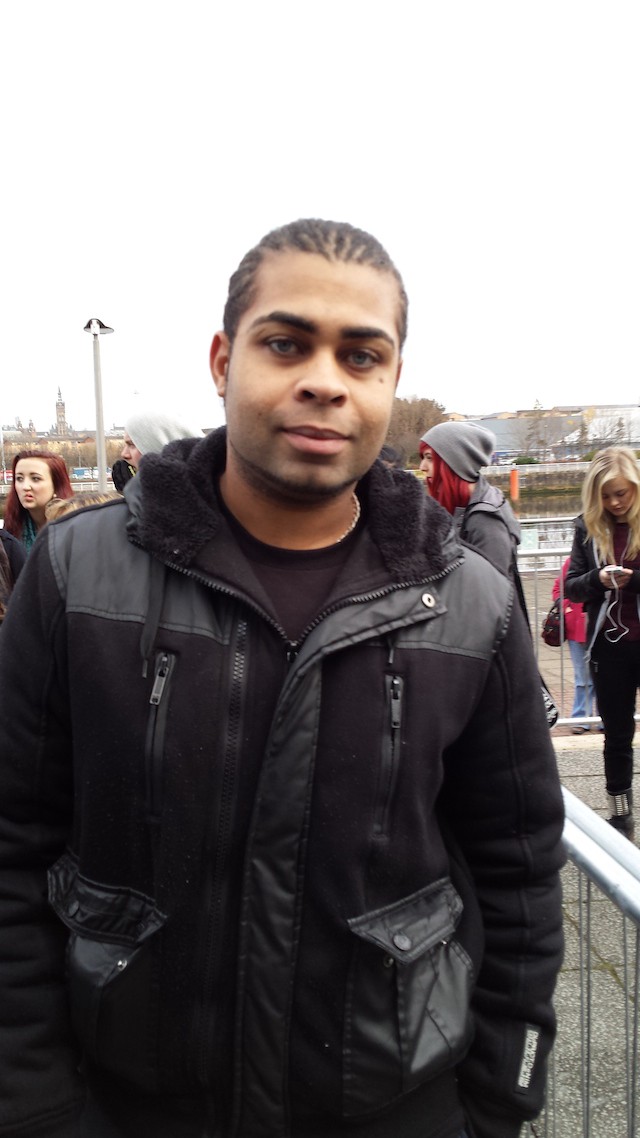
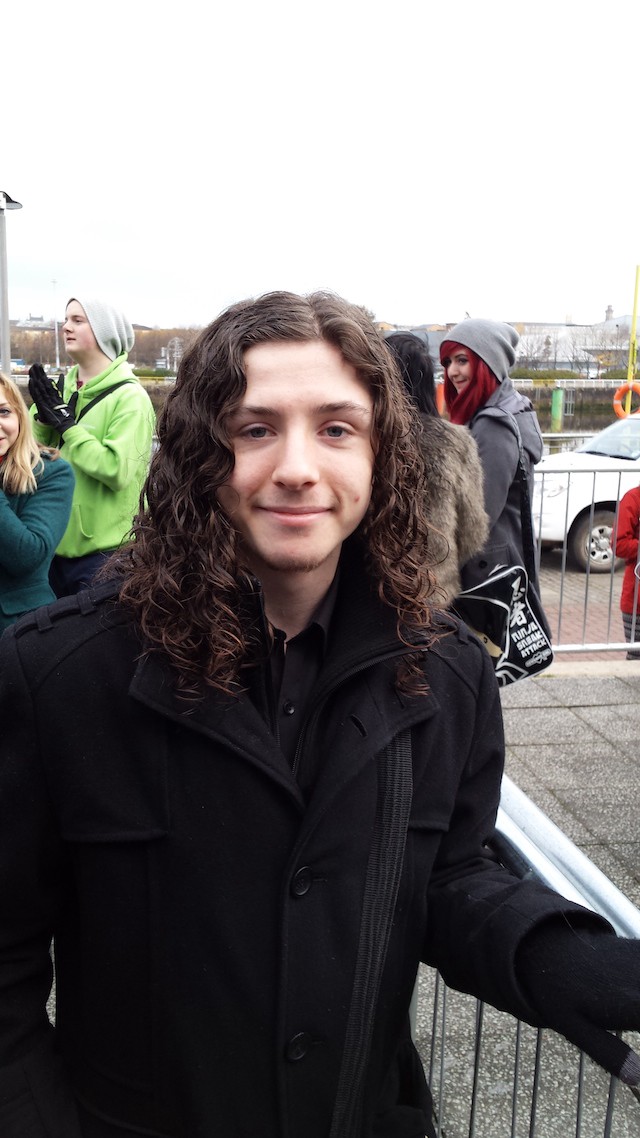
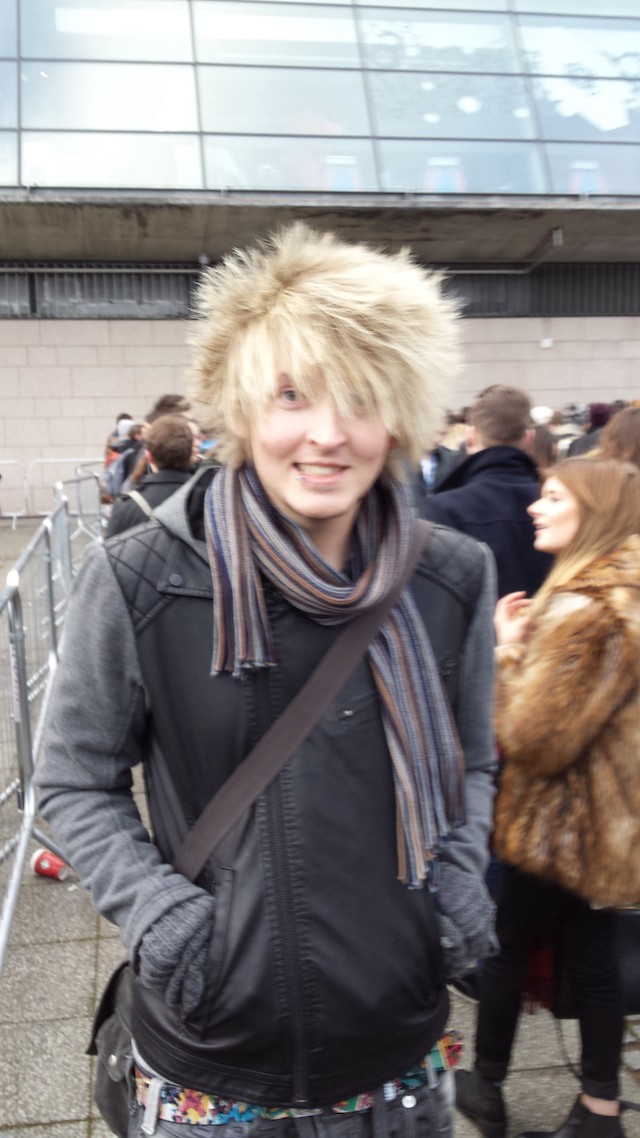
In the few weeks before the auditions there was a bubbling sense of excitement which reminded me of the beginning of Charlie and The Chocolate Factory. A huge film enterprise, thus far closed to mere mortals, was to let two chosen people not only appear in the film but also perhaps take on lead roles.
I was working at my receptionist job at a local community center in Edinburgh the morning it was announced that Disney and Lucasfilm were holding open auditions for a ‘Major Hollywood Movie.’
“I’m too old, dammit,” said Victoria, of the cafe volunteers, “and also they want beautiful, so that rules me out.”
“You are beautiful,” I said and she scoffed.
“You should go for it,” one of the volunteers told Murray, as he pulled the caretaker’s trolley round the corner.
“What, Star Wars?” he said. “Too old, and why would they take me.”
“Harrison Ford was a set carpenter,” said another volunteer.
Julie, who coordinates the day care program, came by to get her mail. “Well, someone has to get it,” she said.
My boyfriend, who loves Star Wars and made me watch the films — “come on, they’re classics, I mean the first three are anyway, the others are shit, but let’s watch them anyway because they’re Star Wars” — was going to audition. I thought this was brilliant, as did our friends — the idea of a shy, awkward science fiction geek getting cast in the film was amusing and sweet.
I called my friend Ed who lives in Glasgow. He hadn’t seen the news. “No shit,” he said.
“They’re auditioning the leads,” I told him. He sucked in his breath on the other end of the receiver.
The momentum tapered a little after the Glasgow auditions were postponed after a debacle down in Bristol, which saw thousands of people turned away after spending a night in the freezing rain outside the Arnolfini art center, which, though beautiful, was simply not big enough to hold them. Yet I knew many people who were still determined to go along and wait, however long it took and however slim their chances of even getting seen.
Also, the postponement felt lucky; my friend Natasha Stiven, an actress who had been living in Australia for the past year, was coming home a day before the new audition date. She had been gutted that open auditions were coming to her country — her city even! — and yet she couldn’t go. The timing seemed like it could be fate.
It wasn’t lucky for everyone. My boyfriend had an exam on the rescheduled Glasgow date, and Ed had to work selling hot dogs at a football stadium. I wished that he could have made it. He’s a great guy and he deserves a shot at a fairytale. I guess we all do.

The night before the auditions in Glasgow, a helicopter went through the roof of a pub by the banks of the River Clyde. The auditions were to begin at 11 a.m., with no overnight queuing allowed. People could only show up from 6 a.m., and loitering with intent to audition was banned. Therefore, Star Wars hopefuls were spared hearing or seeing the accident. A hundred or so people were in the pub; six of the nine killed were there to listen to a ska band.
The people on the morning train from Edinburgh to Glasgow were subdued. The huge TV screen at the station had been showing footage of the accident; so many people stood in front of it that I had to push through them to reach the ticket barriers.
On the train, news reports trickled through on people’s phones and laptops. One person had been killed, but otherwise everyone was okay. Then two people dead; then everyone in the helicopter. Some people had been directly under where it fell. Locals had created a human chain to help people out of the rubble. I hoped no one was still trapped in the pub. I made notes for the auditions and looked out the window as the day became light.

It felt colder in Glasgow than in Edinburgh. While I waited for Natasha’s train I wondered if there was any place I could buy gloves, hat or scarf. I looked in WH Smith; the only hats they had were Tartan with a shock of orange hair coming from the back and a button which played bagpipes if you press it. They sell these everywhere in Scotland though I have never known anyone who has bought one, especially at £8.98. Natasha showed up with her boyfriend, Brodie, an aspiring actor and film maker, and her friend John, known by all as ‘Buffy.’
Also I interviewed my friends on the way to the Science Centre.
Me: So, why do you want to audition for Star Wars?
Natasha: (with a very serious face and an American accent) Well, that’s a very good question, Hope. Let me have a think about that. I’d love the opportunity to star in a movie and… and erm, expand my acting skills. (She pulled a face.) And ask someone else.
Me: Brodie, why do you want to audition for Star Wars.
Brodie: Because it’s Star Wars. Star Wars is amazing.
Natasha: (breaking in) And Natalie Portman did it, and she’s beautiful.
Me: And Buffy, why do you want to audition for Star Wars?
Buffy: I’m just here because it’s a movie that’s going to be remembered for generations and it should be interesting. And Ewan McGregor was in the last one and he’s from Perth.
Natasha: Whoo.
Buffy: Yeah, he was born there, Perth, the city where stars are born, but you wouldn’t think it.
Both Natasha and Buffy are from Perth, Scotland; Brodie is from Perth, Australia. The Australian Perth seems a whole lot more romantic and beautiful; more the sort of place where you can imagine stars being born. I imagine sun-drenched streets; the towering office blocks reflecting in the harbor; the feeling of opportunity and promise and frontier, the city which gave us Gemma Ward and Heath Ledger.
I’ve also never been to Perth, Scotland, but I have heard it has a chilly, brittle beauty. A slight roughness in parts so the locals mock it among themselves, but woe betide an outsider who is sarcastic about Perth. It doesn’t have the same ring of stardom, glamor, adventure, but the thing about stars is that they can come from anywhere, and most people deep-down hold a belief that maybe they are secretly special, or, at least, destined for fame.
In the Star Wars films, Luke Skywalker is living a pretty ordinary life at his aunt and uncle’s farm, until he is discovered, and in turn he discovers that he has a destiny greater than anything he could have imagined. He is called to adventure. It’s a childish desire to have secretly been left on a doorstep as a baby, to be the daughter of the prince of a foreign land. That feeling underlines a sense that we are waiting for our real lives to start, even while we know on a practical level that such dreams of greatness are silly, unreal, the things of myth. Aren’t they?

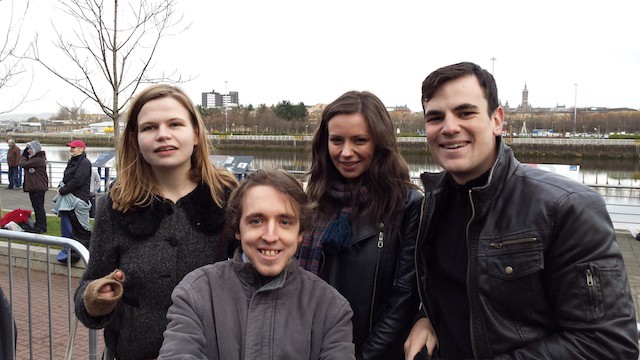
When the taxi pulled up at Pacific Quay we wondered where all the people were. The block buildings of the Science Centre and BBC Scotland and the Crown Plaza Hotel seemed removed from the city.
“Hi, we’ve just arrived at The Science Centre and there aren’t many people in the queue,” said Natasha, who was holding my dictaphone. “I don’t think there are many people because Scottish people in general are very lazy and won’t get up on a Saturday morning,” she narrated.
“Or they’ll get here at eleven when it’s meant to start,” said Brodie.
“Probably,” said Natasha. “Scottish people in general: also not very smart.”
“But you’re Scottish,” I said.
“Yeah,” she said, “I’m allowed to slag off Scottish people because I’m Scottish, that’s the rule.”
We were following a path created from temporary fencing which we assumed was the right way; we reached two of the men in orange coats who would be with us throughout.
“You here for the auditions?” one said.
“You over sixteen and can you prove it?” said the other, before they waved us on.
“Good luck to you guys,” the first one said.
And then we saw the crowd. They were packed densely together in rows near the entrance of the building. There were perhaps 700 people in all. In the distance I could see two stormtroopers bullying through the crowd.
“I feel like I’m auditioning for ‘X Factor,’” said Natasha.
“Yeah, it is a bit like that,” said Brodie.
Near us was a Swedish girl called Anna Bohen who Buffy got talking to. She works as a model in London and drove down to Glasgow the night before; she’d missed the London auditions. She clutched her headshots and modeling portfolio in a Louis Vuitton folder. The model on the cover looked surprisingly similar to her. “It’s not me,” she said.
“Why do you want to audition,” asked Buffy.
“Well, I’m an aspiring actress and I think it’s really good they’re holding open auditions, because I mean, they can get anyone they want, but they’re really interested in the new talent, you know? And it’s a big chance,” she said.
We asked if we could take her picture, but then she saw Brodie with the camera and went all shy. “Do you have to?” she asked.
“Only if you’re OK with that,” Brodie said.
Next we spoke to Ryan, who looked in his early twenties and had styled his hair so it looked like the cossack hat that Julie Christie wore in Dr Zhivago. “I just heard about it on the news and I have a couple of friends who’ve lived here for a while, so decided I’d come through and see them. I’m from California,” he said.
“Really?” I said — he sounded very Scottish.
“No, it’s not a great Californian accent,” he said. “I’m from a small village in Perthshire.”
I’d seen pictures of the Bristol auditions on the news. That line looked exhilarated, happy even though they had waited for hours in the cold. It did not feel that way here. Someone tried to start a wave; it promptly dribbled out. People keep looking at their phones — “three killed now, possibly more” — someone said.
There were, after all, bodies still buried in rubble, trapped under the bottom of a helicopter, just a couple kilometers away. “There’s enough of us to run there and lift the helicopter off them,” someone said.
And we started getting colder. Natasha brought out a flask of soup her mum made. “Oh Hope, I really, really want to be in Star Wars,” she said.
So many people do though. All these people. I didn’t even plan to audition myself, and already I was thinking about how amazing it would be to get a call-back. Standing in a line in the freezing cold makes you want something all the more.

At around half past one the crowd stopped moving. People accepted it for ten minutes, then became restless. What’s happening? Why aren’t they letting anyone else in? Will we get in at all? I ask one of the security men. “They’re just on a lunch break,” one said.
“It would be different if it wasn’t like minus a million,” one girl said.
Half an hour later, the line was still not moving and more people had started griping. “What if I don’t get in because of this, what if they cut the queue just before us?” someone said. Someone else suggested breaking in, and just then the queue once again began to move.
Natasha and I held onto one another’s hands to keep warm. Natasha had gloves, we wore one each. “Does my makeup look OK?” she asked.
“Yeah,” I said, “you just look cold and your lips are a bit blue.”
“Oh God,” she said.
I thought surely they would call Natasha back. When I read about the call-backs in Bristol, people said they chose beautiful girls with dark hair and large eyes. Natasha has that, plus she can act, but she’s also terribly insecure. It is so cold that I wonder how she keeps her hand steady to do her makeup.
“Oh look,” someone shouted, and we look up. At the top of the Science Centre was a party of children aged about six or seven. They were waving at us through the glass and blowing kisses.

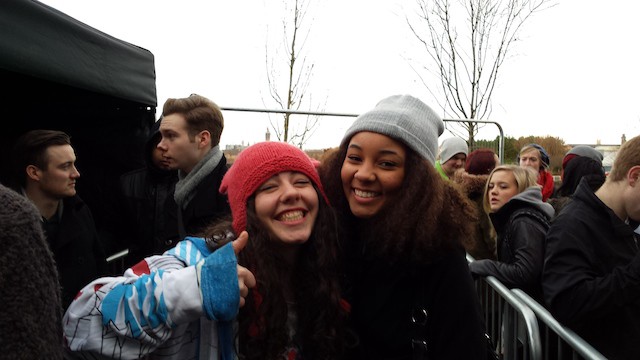
Abruptly we were at the front of the queue. It felt lucky somehow, even though we’d put in our time.
“Come on, let’s all hold hands so we don’t get separated,” said Natasha, and we were all ushered in together.
The warmth was wonderful. We were asked to remove our coats. Along the wall were mirrors, above which were names: ‘Princess,’ ‘Wookie,’ ‘Jedi Knight,’ ‘bounty hunter.’ I brushed my hair in front of one, and suddenly realised that I was nervous. I too, somewhere deep inside, have a craving for the fairy tale, the adventure.
Behind a green mirror, a middle-aged blonde woman called me “darling” and took my form. She seemed nice, but suddenly I was unable to speak. She asked my name, my age, had I done any acting before. “I was in a bit of stuff at school?” I said, and she thanked me, and told me to go round the corner.
On the other side I found Natasha, Buffy and some other folk. Brodie was nowhere to be seen. “I think they kept him,” said Buffy. Still we lingered, looking at Natasha, thinking maybe there was a chance they would come back for her, maybe they were just discussing it, and then the security man came up and said, “Keep on moving through please,” and then we knew it was over.
We waited outside for a few minutes. Brodie came out with a script in his hand. They had given him a wristband with an audition time. Soon afterwards we saw Anna Bohen. She too had a script and wristband.

Later I asked Natasha about her interview.
“Oh, they just asked what I’d done acting-wise and what my favorite parts were,” she said. Brodie sat looking at his script. Anna went off to learn hers alone. We were happy for them. The whole process also felt so arbitrary, even cruel. A lottery where the prize is attention and all that goes with it.
I liked the egalitarian spirit of the auditions. With that comes a sadness. Brodie went in to get filmed reading from his script. They sent him away after that and he hasn’t heard back since. But maybe there’s still time.
Buffy and I decided to walk back to the train station. It was already nearly dark. On the train back, I heard someone saying that the death toll in the pub had risen to eight. I looked at my reflection in the train window and wondered if I’m special.
Hope Whitmore is an Edinburgh-based writer in her twenties who believes in pop culture, and thinks it is just as valid and important as great art, for the common field of reference it gives us. She’s going to be an intern on “Intelligent Life” from January and is amazingly excited about this. She likes lipstick, a lot, and owns about 100.
